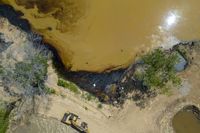BOGOTÁ, Colombia — A newly released investigation has exposed systemic environmental negligence and misconduct within Ecopetrol, Colombia's largest oil and gas company. The Environmental Investigation Agency (EIA), in collaboration with Earthworks, published a comprehensive report titled "Crude Lies" based on the Iguana Papers — a trove of confidential internal documents provided by whistleblower Andrés Olarte Peña, who alleged severe environmental violations by the company.
The report contends that Ecopetrol, which operates under the watchful eye of the Colombian government, managed to conceal more than 600 instances of environmental damage from the authorities between 2010 and 2016, of which about a fifth were kept hidden from regulatory scrutiny. This shocking revelation has drawn attention amidst Colombia's push for greener policies under President Gustavo Petro, who in 2021 proclaimed a commitment to achieve net-zero carbon emissions by 2050.
Despite this pledge, the investigation indicates that Ecopetrol's operations tell a different story. The findings suggest consistent underreporting of emissions and a pattern of deceit regarding environmental damage, raising serious questions about the company’s commitment to sustainability. As the country announced in 2023 that it would halt new oil and gas exploration contracts, the implications of Ecopetrol's practices pose a significant challenge to Colombia's eco-friendly ambitions.
In the years from 2016 to 2018 alone, the EIA indicated that Ecopetrol recorded a staggering 328,779 cases of environmental noncompliance but failed to disclose 89% of those issues to its shareholders. This discrepancy highlights a troubling culture of opacity that pervades the company. In 2018, Ecopetrol controversially claimed in its Integrated Sustainable Management Report that it had experienced five years with "zero barrels spilled and zero incidents affecting people and the environment," while internal records show at least 218 environmental incidents reported in that very year.
While Colombia took legislative strides by passing a law regulating methane emissions from oil and gas in 2022, the EIA found evidence that Ecopetrol continued to flout these regulations, even venting methane gas in populated areas. The dichotomy between the company’s green pledges and their operational reality paints a grim picture of an entity seemingly committed to extraction over environmental responsibility.
In Barrancabermeja, known as Colombia’s oil capital and home to Ecopetrol's largest refinery, local communities have long suffered the consequences of the industry’s negligence. The refinery, established over a century ago on the banks of the Magdalena River, has contributed to widespread pollution and health issues for residents. Environmental activist Óscar Sampayo, displaced due to threats received after denouncing such pollution, highlighted a glaring truth: “There are places where nature is completely degraded and polluted.”
The report further reveals that Ecopetrol has developed a sophisticated monitoring system tracking 1,200 individuals in regions surrounding its operations. This alarming practice raises concerns about the potential for surveillance and intimidation against those perceived as threats to the company’s interests. Sampayo noted that it has been exceedingly difficult to oppose Ecopetrol’s practices, as environmental defenders frequently receive threats from armed groups linked to the oil giant. In 2018, the company reportedly spent $22 million on national security to protect its operations, underscoring its reliance on force to maintain control.
According to a Global Witness report, environmental defenders in Colombia face dire risks, with 79 killed in 2023 alone. Laura Furones, a senior adviser at Global Witness, emphasized the serious dangers inherent in defending the environment in Colombia, stating, “Colombia is a really dangerous place to be an environmental defender.” Olarte, the whistleblower behind the investigation, has also faced intimidation, stating, “Corporate interests can be quite ruthless about what they want to do.”
The findings of the EIA may prove pivotal as the U.S. Securities and Exchange Commission (SEC), which engages in transnational monitoring of U.S. securities laws, now finds itself deliberating over Olarte's whistleblower disclosure asserting that Ecopetrol violated shareholder trust. Michael Kohn, a partner at Kohn, Kohn & Colapinto, noted, “Today’s EIA report, the culmination of a two-year investigation, clearly substantiates the allegations laid out by Mr. Olarte against Ecopetrol.”
The implications are significant. Ecopetrol's practices appear not only to threaten environmental integrity and public health but also challenge corporate governance norms expected by investors and shareholders globally. The company, partially owned by the Colombian government, generates approximately 10% of national revenues and employs over 111,000 individuals, casting it as a critical player in the nation's economy.
Despite its economic heft, however, the EIA report suggests that Ecopetrol is practically untouchable in the eyes of regulatory bodies. Complaints made by Olarte and others have been met with inaction from authorities, with local activists claiming the company wields more power than the Colombian state itself. "In the territory, this dynamic continues where Ecopetrol remains more powerful than the state,” Sampayo stated, encapsulating the growing sense of helplessness among affected communities.
The Ministry of Mines and Energy has indicated that they have found no complaints recorded against Ecopetrol in their databases and that their authority does not extend to disciplining the publicly traded entity. While the Colombian government maintains a stance of diligent enforcement of environmental laws, the report suggests that for Ecopetrol, accountability remains elusive.
Activists like Amarilys Llanos Navarro from the Cesar Without Fracking and Gas Movement argue that what has been revealed in the report is merely a continuation of a troubling trend for environmental defenders in Colombia. “What is in the report is not a new situation for us, but it shows that the company is aware of this,” Llanos said, asserting that the findings encompass a calculated strategy of repression against those standing against the company’s extraction activities.
Llanos emphasizes the necessity of transitioning Ecopetrol towards more responsible energy practices that do not threaten local communities or the environment. “The goal is to make it a responsible company that makes a responsible transition,” she stated, alluding to the urgency of shifting away from fossil fuels toward renewable energy alternatives.
The revelations surrounding Ecopetrol raise vital questions about the balance between economic interests and environmental stewardship in Colombia's oil sector. As the country strives to establish a greener path forward, the reports of ongoing violations highlight the challenges of achieving true sustainability while confronting entrenched corporate power.



